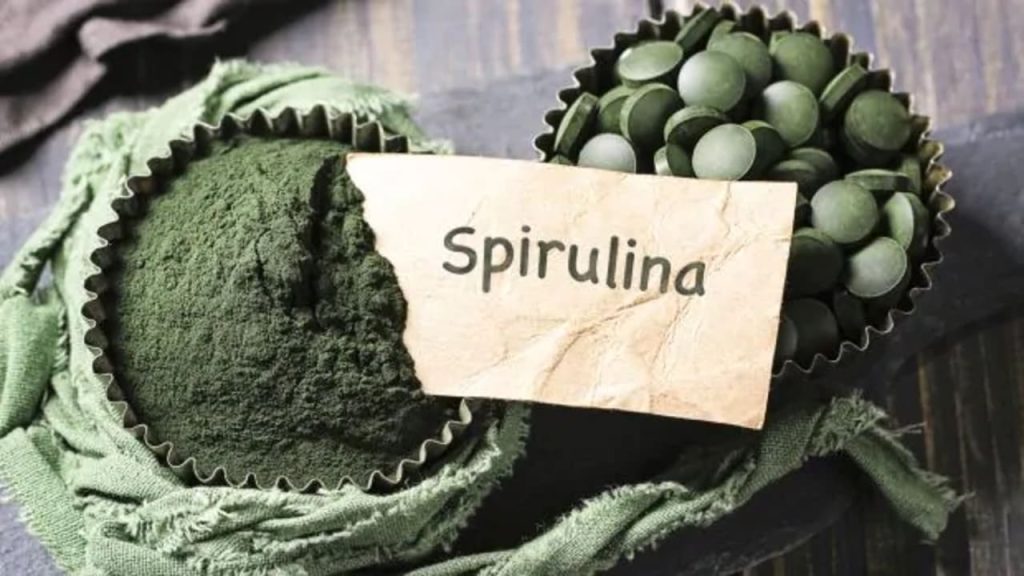As an Amazon Associate I earn from qualifying purchases.
Spirulina is a type of blue-green algae that is rich in vitamins, minerals, and antioxidants. It is a nutrient-dense superfood that is widely used for its numerous health benefits, including improved skin health.
Spirulina is an excellent source of protein, which is essential for building and repairing skin tissue. When used in a face mask, spirulina can help detoxify the skin, reduce inflammation, hydrate the skin, and improve overall skin elasticity.
Nutritional Benefits of Spirulina
Spirulina is known for its high nutritional content, including vitamins, minerals, and antioxidants. It is rich in vitamins A, C, E, and B-complex, as well as minerals like calcium, iron, and magnesium. Spirulina also contains a variety of antioxidants, including beta-carotene, phycocyanin, and chlorophyll.
These nutrients can benefit your skin in a variety of ways. For example, vitamin A can help to reduce the appearance of fine lines and wrinkles, while vitamin C can help to brighten and even out your skin tone. Vitamin E is an excellent moisturizer, while B-complex vitamins can help to soothe and calm irritated skin.
What is a Spirulina Face Mask?
A spirulina face mask is a natural and effective facial treatment that is created by mixing spirulina powder with other ingredients such as honey, avocado, yogurt, and aloe vera. The mask can be applied directly to the face and left on for a certain period of time before being rinsed off.
Ingredients of a Spirulina Face Mask
The main ingredient in a spirulina face mask is spirulina powder. Spirulina powder is known for its high nutritional content, which includes protein, vitamins, and minerals. Other ingredients that are often added to the mask include:
- Honey: Honey is a natural humectant that helps to hydrate the skin and prevent dryness.
- Avocado: Avocado is rich in antioxidants and healthy fats that help to nourish and moisturize the skin.
- Yogurt: Yogurt contains lactic acid, which helps to exfoliate the skin and promote cell renewal.
- Aloe vera: Aloe vera is known for its soothing and anti-inflammatory properties, which can help to calm irritated skin.
How to Make a Spirulina Face Mask
Making a spirulina face mask is easy and can be done at home using natural ingredients. Here is a simple recipe:
- Mix 1 tablespoon of spirulina powder with 1 tablespoon of honey and 1 tablespoon of aloe vera gel.
- Add a few drops of water to create a paste-like consistency.
- Apply the mask to your face, avoiding the eye area.
- Leave the mask on for 10-15 minutes.
- Rinse off the mask with warm water and pat your face dry.

Skin Health Benefits of Spirulina Face Mask
Using a Spirulina face mask can provide your skin with a variety of benefits. Here are some of the key ways that Spirulina can improve your skin health:
1. Detoxification:
Spirulina is a powerful detoxifier that can help remove toxins and impurities from the skin. When used as a face mask, spirulina can help unclog pores and remove dirt and oil, leaving your skin feeling fresh and rejuvenated.
2. Anti-Aging:
Spirulina contains a high concentration of antioxidants that can help protect the skin from free radical damage. Free radicals are unstable molecules that can damage the skin’s cells and accelerate the aging process.
By protecting the skin from free radical damage, spirulina can help reduce the appearance of fine lines, wrinkles, and other signs of aging.
3. Anti-Inflammatory:
Inflammation is a common cause of many skin conditions, including acne, rosacea, and psoriasis. Spirulina is known for its anti-inflammatory properties, which can help reduce redness and swelling on the skin. By reducing inflammation, spirulina can help improve the overall appearance and health of your skin.
4. Improvement of Skin Elasticity:
Spirulina is rich in protein and amino acids, which are essential for building and repairing skin tissue. By improving skin elasticity, spirulina can help reduce the appearance of sagging skin and improve the overall firmness of your skin.
5. Natural Moisturizer:
Spirulina is an excellent natural moisturizer that can help nourish and hydrate the skin. It contains a high concentration of vitamins and minerals that can provide the skin with essential nutrients and moisture. By keeping the skin hydrated, spirulina can help keep your skin looking healthy and radiant.
6. Acne Control:
Spirulina contains antibacterial and anti-inflammatory properties that can help reduce the severity of acne breakouts. By controlling oil production, reducing inflammation, and preventing future breakouts, a spirulina face mask can be an excellent natural solution for acne-prone skin.
How to Use Spirulina Face Mask
- Preparing your face before applying the mask: Before applying the spirulina face mask, it is important to cleanse your face thoroughly. This helps to remove any dirt, oil, and impurities from the skin, allowing the mask to penetrate deeper. You can use a gentle cleanser or face wash to cleanse your face.
- Application of the mask: Once your face is clean, apply a thin layer of the spirulina face mask evenly to your face, avoiding the eye area. You can use a brush or your fingers to apply the mask. Make sure to cover your entire face, including the jawline and neck.
- How long to leave the mask on: Leave the mask on for 10-15 minutes, or until it dries completely. You can use this time to relax and let the mask work its magic. Once the mask is dry, rinse it off with lukewarm water.
- How often to use the mask: You can use the spirulina face mask once or twice a week, depending on your skin type and needs. If you have oily or acne-prone skin, you may benefit from using the mask more frequently.
Risks and Precautions
While spirulina face masks are generally safe to use, there are some risks associated with their use. Some people may be allergic to spirulina, which can cause an allergic reaction. If you experience any itching, redness, or swelling after using a spirulina face mask, stop using it immediately.
If you have sensitive skin, it is important to do a patch test before using a spirulina face mask. Apply a small amount of the mask to the inside of your elbow and wait for 24 hours to see if you have any adverse reactions. It is also important to avoid using the mask on broken or irritated skin.
Conclusion
In conclusion, spirulina face masks offer numerous benefits for improving the health and appearance of your skin. Spirulina is a nutrient-rich superfood that can help detoxify, hydrate, and brighten your skin, while also reducing inflammation and controlling acne.
We highly recommend incorporating spirulina face masks into your regular skincare routine to achieve healthy, glowing skin without using harsh chemicals. With consistent use, you’re sure to notice a visible improvement in your skin’s texture, tone, and overall appearance.
Additional Posts:
- Benefits of Algae Oil: Incorporating Algae Oil into Your Diet and Lifestyle
- What are The Benefits of Chlorella: The Superfood You Need to Add
- 10 Surprising Facts About Algae: What You Need to Know
- Do Mollies Eat Algae
- Do Assassin Snails Eat Algae
Amazon and the Amazon logo are trademarks of Amazon.com, Inc, or its affiliates
